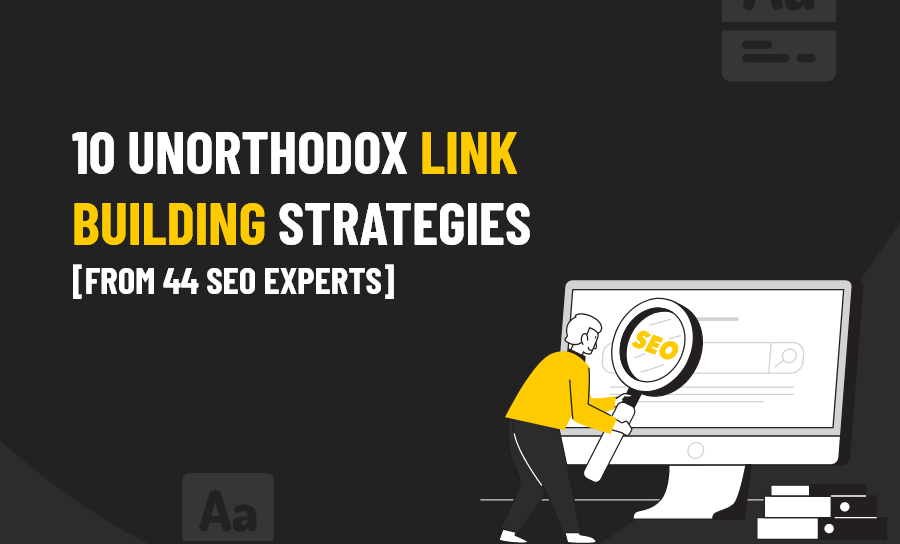![10 unorthodox link building strategies [from 44 SEO experts] 1 10 Link-Building Secrets](https://pearllemon.com/wp-content/uploads/2021/06/image9-4.png)
Whether you’re a digital marketer, an SEO specialist, or a PR manager, link-building is an important part of your work.
To build strong brand awareness, increase visibility, and get a stronger domain rating for your website, you have to use the right link-building strategies to achieve great results. Link building is a crucial aspect of any comprehensive SEO strategy. While many businesses opt to handle it in-house, outsourcing link building to professional companies can provide numerous benefits such as access to specialized expertise, efficient scalability, and a more comprehensive network of industry connections, ultimately enhancing the campaign’s overall effectiveness
When you Google “link-building strategies,” you’ll find answers like:
- Outreach
- Guest blogging
- Analyze competitor links
- Get active on social media
- The usual…
But what are the other link-building strategies that are often overlooked yet drive traffic to other people’s sites? What are the uncommon methods that are being used?
In this comprehensive guide, I’ve featured SEO experts and digital marketing specialists who share their secrets to quality link-building.
Are you ready?
Let’s Dive in!
1. Use Images for Link-Building
![10 unorthodox link building strategies [from 44 SEO experts] 3 Use Images for Link-Building](https://pearllemon.com/wp-content/uploads/2021/06/image11-3.png)
You probably didn’t think of this one! When you publish articles on your website with original, featured images, it adds value to your content and is recognized by Google.
Those featured images are always available on the internet and other people may use them for their own content in the future. When that happens, you have a link-building opportunity!
Lucas Travis, the founder of Inbound Skates used this strategy for his own business and highly recommends it. Travis states, “Create a reverse image search which will show all the sites that are using your photos. Start to message [those] sites, to humbly ask for a backlink since it’s your photo that they’re using.”
Using this strategy, you won’t be cold emailing people to exchange backlinks, instead, you’ll be rightfully asking for links to images that you own.
Tim Sutton, founder of Coffee Geek TV also recommends this link-building strategy. He’s reached out to websites that used his images without links and he says, “I [was building] highly relevant links from my niche. And, most of the time I was getting links with a domain rating (DR) of over 50 as well, which benefits my site’s ranking more.”
2. Publish Niche-Specific Statistics
![10 unorthodox link building strategies [from 44 SEO experts] 4 Publish Niche-Specific Statistics](https://pearllemon.com/wp-content/uploads/2021/06/image7-4.png)
Bloggers, journalists, and writers will always be on the lookout for niche-specific statistics to enrich their articles.
That’s where you come in.
Dmytro Sokhach, CEO of Editorial.Link shared his case: “I love conducting various experiments, and on one of the coffee-related websites, we added statistics on coffee consumption by countries. Over the year, we received about 80-90 backlinks, some of which were from sources like Wikipedia. Statistics proved to be an effective way to acquire free backlinks.
This strategy has been used by SEO experts like Petr Minarik, who uses this strategy for The Cyclists Hub and has seen significant results. Minarik recommends that you reach out to people within that niche and tell them what they can use your data for.
For example, if you publish statistical data about buying puppies in a particular area, you could reach out to pet bloggers to use your data to build content for their audience.
Asim Mughal, co-founder of Webbee Inc. states, “Make sure you are also using beautifully designed images for these stats. This is the information that the journalists…and other bloggers are searching for.”
When you have well-researched, attention-grabbing, high-quality data, then you have a chest full of marketable content to share with other websites. This leads to quality backlinks because the sites will be relevant to your niche and position you as an expert source.
This is a useful strategy in getting backlinks especially when you turn those statistics into infographics. Hafiz Muhammad, the CEO of Omni Core Agency swears by this method, he states, “We like to do a blog post with the stats and put it into a nice, shareable infographic. And from there, the links often come in on their own.”
Many people agree with this strategy including Jerry Han, the Chief Marketing Officer at Prize Rebel. Han states, “An infographic provides useful content that is appealing, attractive and most importantly, very easy to share and embed. When another website is talking about the same topic, it is a great resource to embed and link back to a website when giving credit.”
Devin Schumacher, the founder of SERP agrees, he states, “As a marketer, I take advantage of this need by distributing quality, fact-based infographics. To encourage backlinks to the business website, I create charts, graphs, and scales, then distribute them to industry peers and competitors.”
By creating these infographics or blogs with statistical information, you add value to your readers and have what we call “linkable content.”
Ajay Paghdal of OutreachLabs adds if collecting unique and impactful data isn’t in your wheel house, you have options. There are census companies, for example, that specialize in efficiently and cost effectively collecting data for you.
If you find a solid mix of the research, writing and design vendors, you can unlock this powerful link building strategy.
3. Rewrite Outdated Content
![10 unorthodox link building strategies [from 44 SEO experts] 6 Rewrite Outdated Content](https://pearllemon.com/wp-content/uploads/2021/06/image10-4.png)
Now, hear me out…
This may not sound particularly exciting, but it’s a strategy that actually works. It takes time because you have to identify the right articles to refine.
How do you do this? Glad you asked!
Liam Scout, the founder of Safe Work Wears breaks it down in this way:
- Adjust Google settings display results that are at least one year old
- Search for the keyword you’re looking for on Google
- Analyze the results and choose the outdated articles to add to your list
- Update the information in those articles with relevant data
- Use the URLs from each of the articles in Ahrefs and export the backlinks
- Scrape the relevant email addresses and reach out to all the prospects to ask them to link to the updated article you’ve published
In this six-step strategy, you’ll update old articles and provide more value to the readers who will click on your links. Digital marketers like Liam Scout have used this link-building strategy before and recommend it because not many people are doing this.
4. Get on Business Listings
![10 unorthodox link building strategies [from 44 SEO experts] 7 Get on Business Listings](https://pearllemon.com/wp-content/uploads/2021/06/image8-4.png)
If you are a founder of a company that relies on local customers, but your business is not listed on any of the local directories then what are you doing?
Business listings are a good place for you to get quality backlinks that could potentially lead your target customers straight to your website.
Igor Avidon, the founder of Avidon Marketing Group recommends that businesses take advantage of these online directories for both lead generation and link-building purposes. Avidon states, “A backlink from a niche directory can lead to relevant referral traffic to your website. That’s why we are registered on large marketing agency directories to amplify our online presence and brand awareness.”
When you add your company to online directories, you’re not just going to benefit because of the links, but also from the brand awareness you’ll build. This is especially useful for businesses that rely on local clientele.
Tyler Garns, CEO of Box Out Marketing recommends this method. Garns states, “Include your brand in your local listings. Concentrate on the ones with a large number of followers. Other websites may utilize your link on their website if they rely on these listings to recommend products and services in the area.”
Another method you could is to target government and educational institutions for quality backlinks. Harrison Sharrett, a Digital Marketing Specialist at London Office Space recommends this strategy. Sharrett states, “Websites associated with government or educational bodies are often highly authoritative and carry a lot of weight in organic search rankings. However, building links on these types of sites requires a lot of time, patience, and perseverance, resulting in the vast majority of link-builders not even bothering to reach out.”
Sharrett continues, “I have found that targeting these types of sites via their resource lists or discount pages can lead to great results – provided that your product or service offers value. A simple ‘in URL:’ search of ‘.gov’or ‘.edu’ in tandem with terms such as ‘alumni discount’, ‘resource list’, and ‘submit a link’, will present you with a variety of websites to target. You can also use tools such as Hunter to track down their contact information.”
This is yet another link-building strategy that is often overlooked because it seems tedious and unattainable. The benefits are endless because getting quality backlinks from business listings, government or educational sites can provide great results.
But it shouldn’t only stop at business listings, as a rule of thumb, it’s good to have a company profile on top sites. Subhash Kashyap, an SEO Specialist at The Web Hospitality recommends this, “Listing your business on these below top sites can surely help your agency grow:
- Clutch (Must for Connecting Your Brand with Big Projects)
- Hubspot
- The Manifest (Clutch Profile Can Fetch It)
- Agency Spotter
- Proven Expert
Being one step ahead of the competitors is becoming difficult day by day and building quality backlinks is the same prospect on which we as a marketing consultant do work on regularly.”
5. Look for Unlinked Brand Mentions
![10 unorthodox link building strategies [from 44 SEO experts] 9 Look for Unlinked Brand Mentions](https://pearllemon.com/wp-content/uploads/2021/06/image2-4.png)
Sometimes people reference your brand or company name without linking to your website. You probably haven’t thought about this much, but just try to do your research and see what you find.
Abby Herman from Snap Agency states, “It’s important to keep in mind, however, that not all publications link at all. Sometimes they mention your name but don’t link.”
It’s possible that you’ll find multiple unlinked brand mentions on websites that are relevant to your niche. You may not find hundreds, but you may find several link-building opportunities this way.
People like Tanner Arnold, the CEO of Revelation Machinery, have used this strategy for link-building. Arnold found multiple instances where his brand name was used without proper links. Instead of ignoring it, he reached out to the right people to ask them to link back to his website. He states, “A website that already mentions your company is more likely to link back to it for additional information.”
Arnold also insightfully recommends that when you look for unlinked brand mentions, you should also look for employee names, quotations, and even distinct services you give. These are all potential link-building opportunities, all you have to do is reach out and find them.
Jordan Whitehead, an SEO Specialist at Net Sixty Six agrees with this strategy, he states, “I always start my campaigns by looking for unlinked brand mentions on Google. This helps me get some quick win links and grow the domain authority of the website faster.”
Whitehead continues, “The reason why this link building strategy has such a high success rate is that there’s already an existing relationship between the website and your client so when they receive an outreach email it will be more personal.”
Francesca Nicasio, a Content Marketer at Payment Depot shows us how to handle it better, she states, “When I discover a mention, I look for other people’s articles that I think would benefit from linking to a piece of our content and then reach out to them to tell them how linking to our material makes theirs better.”
6. Exchange Quotes, Not Links
![10 unorthodox link building strategies [from 44 SEO experts] 10 Exchange Quotes, Not Links](https://pearllemon.com/wp-content/uploads/2021/06/image3-4.png)
It’s faster and easier to exchange random links with anyone on the internet. The problem is, it’s not a sustainable strategy for those in search of quality backlinks.
When you switch gears and try to provide value as a link-building strategy, then you’ve cracked the code. SEO experts, link-building specialists, and media relations managers agree that this is a powerful way to obtain backlinks from sites that are relevant to your target audience.
The media relations manager at Epignosis, Eri Panselina, swears by this method. Panselina doesn’t think that exchanging links is a good strategy because it doesn’t provide value to your readers or target audience. Instead, you should use quote exchanges. Panselina states, “I identify blogs where I can provide comments from one of our experts. It’s a tactic that requires more research and time, but it has a much bigger success rate.”
If you want a quick fix, then this strategy may not work for you. But if you want to be helpful to writers and provide expert commentary on topics relating to your niche, then I highly recommend this method.
Marcus Clarke, founder of Searchant agrees with this, he states, “Your content needs to be a reflection of an expert—well-researched and detailed. That’s the type of content that attracts backlinks. An example is to create comprehensive guides. Nowadays, you need to impart extensive and professional knowledge in your content so that they may become useful resources for viewers which would result in generating more backlinks.”
If you want to take this to the next level, then you sign up as a contributor on platforms like HARO, Quora, and Terkel. These platforms are designed to connect you to journalists who need sources to quote in their articles. Major publications like Forbes, The Financial Times, Business Insider, and Entrepreneur feature quotes from sources just like you!
Namratha Ambat, a Digital Marketer at GemPool recommends signing up as a contributor on these platforms as well. Ambat states, “These sites usually send around a list of queries from different sources looking for insights on topics, where you get a chance to share your experience or knowledge.”
Though contributing quotes and commentary is lucrative, you won’t always get the features that you want.
Ambat highlights this and states, “These activities are really a numbers game. Do not be disheartened if you don’t see a response to every contribution you send. But remember that the more you send out, the better chance you have at attracting more links to your website.
When you’re able to provide expert commentary on niche-specific topics, then you can get links from major publications that will greatly boost your brand visibility. Our PR team at Pearl Lemon has used this strategy to feature Deepak Shukla, in major publications. Others have done this as well.
Jason McMahon, a digital strategist at Bambrick agrees with this rationale. He uses HARO to get his quotes featured on top publications. He explains the process this way, “HARO is arguably one of the best platforms for obtaining high-quality links. All you have to do is create a source account. Then you’ll write replies to queries that you’re interested in and know a lot about. The remarks should be brief but actionable, no more than 200 words in most situations.”
On a platform like HARO, you have to respond to queries quickly because they come in three times a day. It’s completely free to make an account and it provides lots of value to you and your target audience.
7. Combine Your PR & SEO Strategies
![10 unorthodox link building strategies [from 44 SEO experts] 12 Combine Your PR & SEO Strategies](https://pearllemon.com/wp-content/uploads/2021/06/image4-4.png)
Many public relations strategies can be used to improve your website’s SEO. Getting featured on major publications does not always have SEO value, sometimes it’s just about the “clout.”
But if you sit down and strategize, you’ll find that combining your PR and SEO strategies will make a huge difference for your business.
The SEO nerds might be shocked by my statement, but hear me out. SEO is meant to improve your rankings on search engines, right? And PR is meant to boost your brand visibility, polish your brand image, and lead you to your target customers, right? So are these two fields really all that different?
I mean, the objectives are the same.
Mark Webster, the Co-Founder of Authority Hacker states, “PR is a huge opportunity for link builders and one which is largely untapped.” Webster described how PR helped him get links with publications like Vice that provided immense value to his website’s SEO. He continues, “This is a largely untapped method which many people aren’t willing to spend the time and effort on…there’s virtually zero competition here. That to me makes it a winner!”
This isn’t the popular advice that you’ll receive for link-building, that’s exactly why you should use it. There’s less competition.
Justin Smith, the CEO of OuterBox recommends that you think of your PR pitches in terms of websites that can improve your domain authority. He states, “While often thought of as two independent tactics, your PR efforts should be informed by your SEO strategy. A few links from the right websites will make a big impact on your SEO efforts.”
Don’t take my word for it, try it out for yourself! This strategy is excellent for long-term growth. But if you’re looking for a quick fix, then it’s best to stick to exchanging links with random websites on the internet.
8. Master Your Target Audience
![10 unorthodox link building strategies [from 44 SEO experts] 13 Master Your Target Audience](https://pearllemon.com/wp-content/uploads/2021/06/image5-4.png)
When you know the needs, desires, and doubts of your target audience, then the ball is in your court.
Don’t underestimate market research and customer analysis. These tools can guide you in your process of content creation. In fact, you can’t have a strong link-building strategy without fully understanding your target audience. The problem is that many people don’t think about the relevance of their links.
William Ward, CEO of Translation Equipment HQ explains it perfectly, he states, “Link building is easily done by giving relevant content to relevant people. The problem most people have is they try to get a huge amount of links out there and don’t consider traffic and relevancy.”
Think of the people who will click on those links, what value are you providing to them? Edward Mellet, founder of WikiJob believes that understanding your target audience is essential for building good link-building plans.
Mellet states, “You must create connections and material that cater to the likes and tastes of your target audience. Otherwise, you’ll be wasting your time generating irrelevant links that won’t generate any interest or drive additional visitors to your website.”
He’s right, many people approach link-building without their target audience in mind. That approach is rather ineffective. Sam Browne, the founder of Find a Band recommends that you also think critically about the websites you get backlinks from.
Browne states, “You must target sources that your target audience frequent or follow, such as websites and blogs. As a result, the links you create will be more efficient, allowing you to engage your audience and raise awareness.”
You can also offer other things to your target audience that encourage customer engagement. Greg Dickens, founder of Epilocal recommends this as well, he states, “Build something small but valuable to your target audience, then give it away for free. This makes it easy to reach out to blogs in your industry to get backlinks. I’ve done this in the past with themes, templates and research reports, but it could also be data, premium content, worksheets, you name it – whatever might appeal to your audience!”
But in order to do this, you need to have a deep understanding of what your target audience likes and is willing to engage with.
9. Create Linkable Content
![10 unorthodox link building strategies [from 44 SEO experts] 15 Create Linkable Content](https://pearllemon.com/wp-content/uploads/2021/06/image6-4.png)
By this, I mean, create content that adds value to the reader – and is worth linking to. When you create amazing content, you’re more likely to get more backlinks, and rightfully so!
Even if you follow all these link-building secrets in this article, if your content is not worth linking to, then your efforts are useless. Even when you use guest blogging as a link-building strategy, you won’t achieve the desired outcomes if the content is not excellent.
Tony Kelly, the CEO of Camera Grove, explained it perfectly. Kelly states, “Content is the most effective way to increase client engagement, interest, and loyalty among your audience. For your material to be as effective as you want it to be, it must be of the highest quality and highly relevant to your target audience.”
Many people agree with this, including Peter Horn, from Geoff McDonald and Associates. He states, “As a Content Lead at a law firm, I’m not going to go and give advice about the best pie in Virginia – that makes no sense for our brand and might not even be helpful for the writer who’s likely looking for food critics. You need to make sure you can offer relevant advice that’ll help the writer’s article. If you’re just there to promote your brand and build links, you’re going to have a difficult time actually getting results.”
Make your content “highly relevant to your target audience” and ensure that it is of the highest quality possible. For example, Jack Altmen, an SEO executive at Think Orion uses Reddit queries to build his content. Altmen states, “We are always on the lookout for user queries that can be found on platforms like Reddit. We create content around those queries and share it on multiple platforms to derive referral traffic. This way we generate natural backlinks.”
Another thing to keep in mind is that writing important articles and sharing them with authority websites could help you obtain quality backlinks. When you contribute expert commentary or articles, you build credibility within your niche.
Sep Niakan, a managing broker at Condoblackbook agrees with this, he states, “Contributing articles will help you establish trust on the web. The registration procedure is quick and simple. Over 200 SEO specialists took part in a study and rated content creation as the greatest strategy for connecting with others.”
This can be done through guest blogging, exchanging quotes for links, or getting featured in expert roundup articles. The thing is, you have to have something worth reading. Many people highly recommend guest blogging for link-building.
Sai Blackbyrn, CEO of Coach Foundation states, “Guest-blogging is the fastest, most efficient link building strategy for those in my industry. I credit it for helping me achieve brand recognition across different audience types online. Guest blogging gives you the opportunity to showcase your knowledge and expertise to a new audience. Moreover, it helps you build connections with other visible players in your industry.”
Guest blogging can be lucrative for your website, but only if you create amazing content. Don’t just write anything and expect it to yield outstanding results. To find good websites for guest blog, you can follow Lily Ugbaja’s advice.
Ugbaja, the Founder of Dollar Creed, states, “You can either cold call/pitch to sites that have a high DA rating and have good traffic or find sites that are looking for guest bloggers through Google Search Operators. If your content is good, there is a high possibility it would be accepted, after all, it’s free!”
Abdulaziz Ali, a Content Strategist at Digital Growth Boost reminds us that even though guest blogging is great, you shouldn’t pitch to the same source, he states, “…Each subsequent link from that [same] source is less valuable (link-wise).”
Another guest posting strategy includes partnerships. Kateryna Reshetilo, Head of Marketing at Greenice explains, “You can partner with others in your niche and mention each other in guest posts. If done right, this can greatly amplify your results.”
Writing or featuring in expert roundups is also a good way for your to add value to your target audience and position yourself as an expert in your field. It’s also a great link-building strategy.
Benjamin Rose, Co-Founder of Trainer Academy states, “Expert roundup blogs have gained a lot of traction as a terrific link-building tactic in recent years. Because you invite industry experts to contribute to a single topic, which is subsequently published as an article, a roundup post has the potential to generate a lot of social shares and links.”
You could reach out to experts in your field to feature in your expert roundup that you’ll publish on your website. This strategy can improve your domain rating over time, increase your brand visibility and drive more leads to your site.
10. Fix Broken Links
![10 unorthodox link building strategies [from 44 SEO experts] 16 Fix Broken Links](https://pearllemon.com/wp-content/uploads/2021/06/image1-5.png)
Another worthwhile strategy is in reaching out to websites to fix their broken links. Luat Duong, an SEO Specialist at Scandinavian Biolabs acknowledges that this may be one of the oldest link-building strategies, but it’s not an outdated one.
Lacy Summers, the Chief Marketing Officer at Crush the PM Exam explains, “Broken link-building is the process of finding broken links on websites and offering a page of your own as a substitute link. Essentially, you’re seeking for pages in your business that have broken outbound ties that could lead to you. Once you’ve located one, inform them that the link is broken and suggest that it be replaced with a relevant piece of content from your site. While the manual outreach approach isn’t ideal, it can deliver some rapid wins when done right.”
You don’t have to manually look for the broken links yourself, you can use SEO tools to crawl those websites and do t1hat heavy lifting for you. Louis Watton the Marketing Executive at Shiply explains, “As an added bonus, you can find all the sites linking to this broken page and reach out to all of them to try and multiply your results. One thing to note is that this tactic obviously works best when your content is an adequate replacement to the broken page so make sure you are covering the same content (you can use Waybackmachine to see what was on the broken page).”
Jabez Reuben, founder of the Blueprint SEO Agency suggests using SEO tools like Ahrefs or SEMRush to analyze your backlinks and to easily find broken links.
All these 10 link-building strategies can greatly improve your website’s domain rating, increase your brand visibility, and lead your target customers straight to you.
FAQs
Here are some of the benefits of the right SEO link building strategy:
- Increase web traffic
- Greater revenue opportunities
- Build credibility
- Rank higher
Yes! Link building still works and is effective. Many companies need to find the right link building strategy that suits them or take things to the next level with advanced link building strategies.
Here are SEO specialist link building techniques for outreach:
- Be professional with personality
- Don’t beg or sound desperate
- Don’t disrespect their skills in their role
- Keep it short and clear
Google link building strategies can improve your domain authority and rankings through these three types of links:
- Backlinking
- Inbound links
- Outbound links
Using these different link types can help you form one of the best whitehat link building strategies.
Link building strategies are ways to gain links back to your site and improve your rankings in Google. SEO link building can also improve your domain authority in the process.


![10 unorthodox link building strategies [from 44 SEO experts] 2 Book a Call](https://pearllemon.com/wp-content/uploads/2021/05/Banner-Book-a-Call-rounded-1-1024x293.png)





